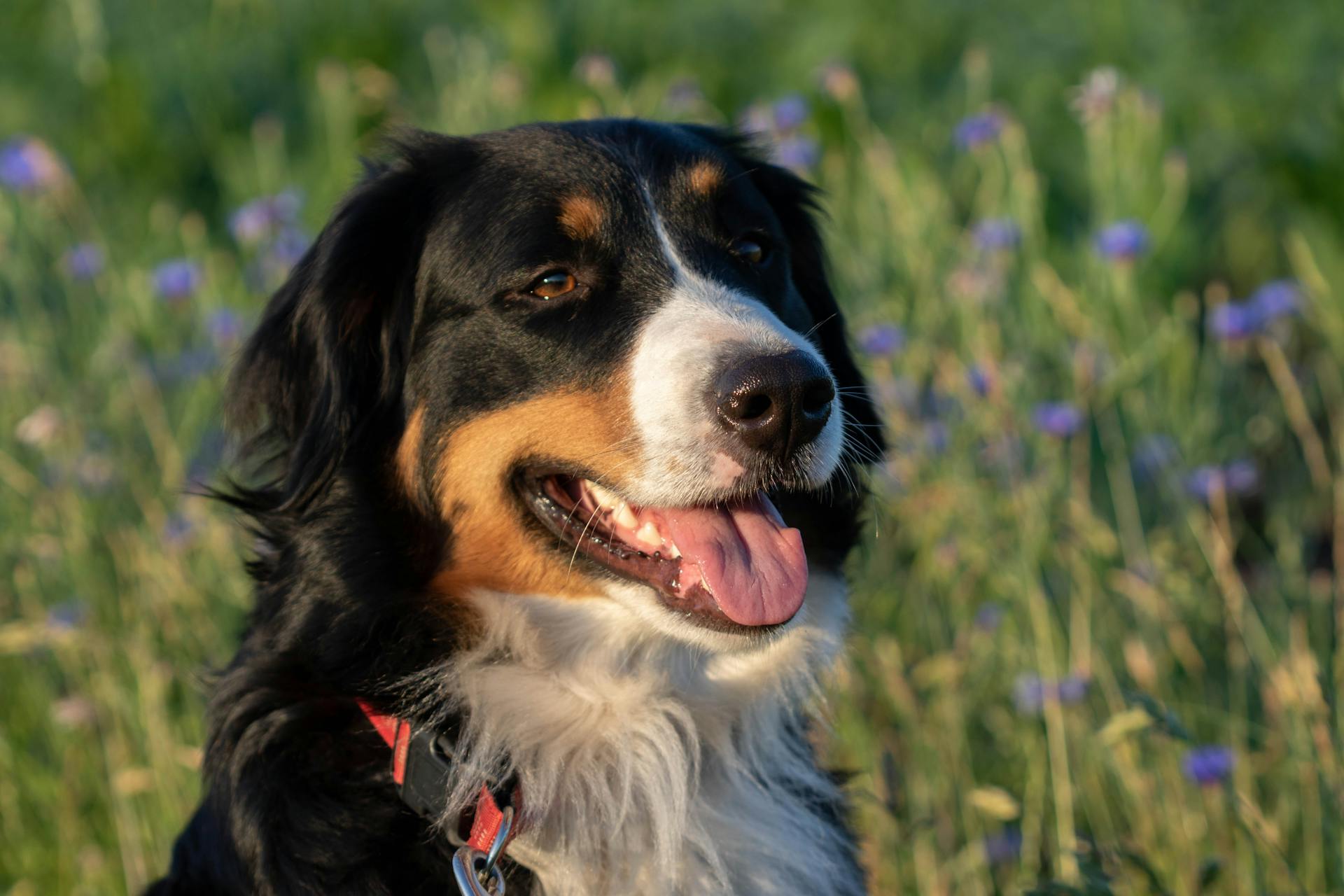
The Bernese Mountain Dog and Leonberger are two large breeds that have captured the hearts of many dog enthusiasts. They share a similar appearance, with thick coats and sturdy builds.
Both breeds originated in Europe, with the Bernese Mountain Dog hailing from Switzerland and the Leonberger from Germany. They were initially bred for specific purposes, with the Bernese Mountain Dog serving as a farm dog and the Leonberger as a guard dog.
Despite their similarities, these breeds have distinct characteristics. The Bernese Mountain Dog typically weighs between 80-120 pounds, while the Leonberger can weigh up to 170 pounds.
You might like: Guardian Dog Breed
Choosing the Right Breed
Leonbergers and Bernese Mountain Dogs make wonderful family pets, but it's essential to consider their unique qualities before making a decision.
Both breeds are intelligent, loyal, and affectionate, making them great companions for active families. They are also gentle and laidback, but Leonbergers tend to be less dependent on their owners than Bernese Mountain Dogs.
If you have young children, a Bernese Mountain Dog's patient and tolerant nature might make it a better fit for your family. They are perfect for families who can devote the time and attention needed to care for these giant breeds.
Leonbergers, on the other hand, are a great choice if you want a dog that is less needy and more independent. They still require plenty of love and care, but they are more laidback than Bernese Mountain Dogs.
Remember, both breeds have a shorter lifespan than smaller breeds, so cherish every moment with your new furry friend.
Broaden your view: Livestock Guardian Dog Breed
Characteristics of the Bernese Mountain Dog and Leonberger
The Bernese Mountain Dog and Leonberger are two breeds that make wonderful companions. They're both known for their gentle nature and high trainability, making them a great choice for novice dog owners.
One of the standout characteristics of both breeds is their affectionate and gentle disposition. They thrive on human interaction and attention, so they need a family that can devote plenty of time to them.
The Bernese Mountain Dog, in particular, needs a lot of attention and can't stand loneliness. They'll become depressed and destructive if left alone for too long, so it's essential to have a family that can spend quality time with them.
Both breeds are also highly intelligent and eager to please, making them relatively easy to train. However, they do require positive reinforcement training and consistent socialization from an early age.
Here are some key characteristics of the Bernese Mountain Dog and Leonberger:
It's worth noting that both breeds have a tendency to bark, especially the Bernese Mountain Dog, which can make an excellent watchdog when properly trained. However, they do require regular exercise to stay healthy and happy.
Overview and History
The Bernese Mountain Dog and Leonberger are both large, loyal breeds that make great family pets. They were both originally bred for hard work on farms in Europe.
The Bernese Mountain Dog was bred in Switzerland for farm work, and is known for its strength and resilience. It has a broad, flat head and a wide muzzle, with dark eyes. The Leonberger, on the other hand, was bred in Germany to resemble a lion on the coat of arms of Leonberg.
Here's an interesting read: Leonberger
Both breeds require regular grooming to stay healthy and in top condition. The Bernese Mountain Dog has a long, thick coat that comes in black, white, and rust colors, while the Leonberger has a distinctive lion-like appearance.
The Bernese Mountain Dog is prone to health issues such as hip dysplasia, elbow dysplasia, and bloat, while the Leonberger can be sensitive and prone to certain health problems. Regular checkups with the vet are recommended for both breeds.
- Bernese Mountain Dog health issues: hip dysplasia, elbow dysplasia, bloat, eye problems, skin allergies
- Leonberger health issues: sensitive, prone to certain health problems
History
The Leonberger breed has a rich history that spans over a century. It originated in Leonberg, Germany, during the mid-1800s.
Heinrich Essig, a gentleman from Leonberg, claimed to have bred a Landseer Newfoundland and a St. Bernard multiple times, and later crossed the offspring with a Pyrenean mountain dog. This is believed to be the foundation of the Leonberger breed.
The breed was bred to resemble a lion on the coat of arms of Leonberg, which is a unique and fascinating aspect of its history. The breed became popular in royal and imperial households across Europe, including France, Austria-Hungary, Germany, and Italy.
Related reading: Leonberger Pyrenean Mountain Dog

The first Leonberger clubs were established by breed owners in 1891, and the breed was used for various purposes, including pulling carts on farms. They were also used to pull ammunition carts during both World Wars.
The Leonberger nearly became extinct during World War I, but was saved by a group of enthusiasts who worked to preserve the breed. The breed's population dwindled during this time, but it was later revived.
The Leonberger first appeared in the U.S. and Canada in the early 1900s, where they were imported by the Canadian government to perform as water rescue dogs. Unfortunately, the breed's popularity faded in the U.S. during the Great Depression.
The Leonberger Club of America was formed in 1985, marking a significant milestone in the breed's history. However, it wasn't until 2010 that the breed was officially admitted to the AKC working group.
Consider reading: Bernese Mountain Dog Group
Overview
The Bernese Mountain Dog is a wonderful breed that thrives on affection and companionship. They are loyal and devoted pets that make excellent family dogs.

These dogs are large, sturdy, and strong, with long, thick coats in colors of black, white, and rust. They have a broad and flat head with a wide muzzle and dark eyes.
Bernese Mountain Dogs need plenty of exercise to stay healthy and happy, making them a great choice for those with active lifestyles. A daily walk of at least 30 minutes is recommended to keep them in top condition.
They can be prone to certain health issues, including hip and elbow dysplasia, gastric torsion, and mast cell tumors. Regular checkups with the vet are essential to monitor their health.
Bernese Mountain Dogs are highly intelligent and can learn basic commands quickly, but they may be difficult to train due to their stubborn streak. Positive reinforcement is key to successful training.
Here are some common health issues that can affect Bernese Mountain Dogs:
- Cancer
- Hip and elbow dysplasia
- Gastric torsion
- Mast cell tumors
Their average lifespan is between 6 and 9 years, so it's essential to provide them with a loving and caring environment to ensure they live a happy and healthy life.
Care and Upkeep
The Bernese Mountain Dog is a large breed that requires a lot of space to move around, so you'll need a home and transportation that can accommodate its size.
A Bernese Mountain Dog needs to have access to soft bedding to prevent callouses and bursitis, a painful condition that affects the cushioning sacs between its tendons, joints, and tissues.
It's essential to provide your Bernese Mountain Dog with regular exercise, such as walking or playing, for at least an hour during the cool parts of the day.
The breed loves to engage in activities like tug, swimming, nose work, and trick training, and some even enjoy carting and sled pulling.
However, be aware that Bernese Mountain Dogs are prone to shedding and drooling, which can be a challenge for fastidious housekeepers.
To keep their coat healthy, you'll need to brush your Bernese Mountain Dog weekly and bathe them occasionally, with daily brushing during seasonal shedding.
You might like: Bernese Mountain Dog Standard
Regular vet checkups are also crucial to monitor their health and catch any potential issues early on, as Bernese Mountain Dogs are prone to gastric dilatation-volvulus and mast cell tumors.
Food bills for big dogs like the Bernese Mountain Dog can add up quickly, so be prepared for a bigger appetite and larger food bills.
Explore further: Bernese Mountain Dog Food Calculator
Key Features and Comparison
Both Leonbergers and Bernese Mountain Dogs are highly intelligent breeds that thrive on mental stimulation and exercise. They require plenty of physical activity to stay healthy and happy.
They are also prone to some health issues, so regular vet checkups are essential. Both breeds are known for their gentle nature, earning them the title of "gentle giants" from their loving owners.
One key difference between the two breeds is their level of dependence on their owners. Leonbergers tend to be less dependent, while Bernese Mountain Dogs are more patient and tolerant, making them a great fit for families with young children.
What They Have in Common

Both Leonbergers and Bernese Mountain Dogs are highly intelligent breeds that thrive on mental stimulation and exercise. They require regular physical activity to stay healthy and happy.
They're both eager to please and willing to learn, making them great companions for active owners. This eagerness to learn also means they need consistent training and socialization from an early age.
Both breeds are prone to certain health issues, so regular vet checkups are essential to prevent or manage these problems. This includes keeping up with preventative care, such as vaccinations and parasite control.
Their gentle nature has earned them the nickname "gentle giants" from their loving owners. This gentle temperament makes them great family pets, especially for families with children.
Key Differences Between the Breeds
When comparing the Leonberger and Bernese Mountain Dog, one of the most noticeable differences is their size. The Leonberger can weigh up to 170 pounds, while the Bernese Mountain Dog tops out at about 110 pounds.

The Leonberger's coat is shaggier and requires more frequent brushing and trimming than the Bernese Mountain Dog's coat. This means that Leonberger owners will need to commit to regular grooming sessions.
The Bernese Mountain Dog's patient and tolerant nature makes it a great choice for families with children. This temperament is a significant advantage for households with kids.
Recommended read: Bernese Mountain Dog Coat
At a Glance
The Bernese Mountain Dog and Leonberger are both large breeds with impressive physical characteristics.
Their average height ranges from 25 to 32 inches, with the Leonberger being the taller of the two.
Here's a comparison of their average weights: Bernese Mountain Dog (75-115 lbs) and Leonberger (110-170 lbs).
Both breeds have a relatively long lifespan, ranging from 7 to 10 years.
Regular exercise is essential for these high-energy breeds, which means you'll need to plan for plenty of physical activity.
When it comes to grooming, the Bernese Mountain Dog requires heavy coat care, while the Leonberger needs medium coat care.
Both breeds are known to be family-friendly and make excellent family pets.
A different take: Bernese Mountain Dog Family
Frequently Asked Questions
What is a Bernese Mountain Dog and Leonberger mix?
A Bernese Mountain Dog and Leonberger mix is a hybrid breed known as a LeoBerner, resulting from the cross between an AKC Leonberger and an AKC Bernese Mountain Dog. This unique combination brings together the strengths of two mountainous breeds from Switzerland and Germany.
Sources
- https://www.britannica.com/animal/Bernese-mountain-dog
- https://www.dogster.com/dog-breeds/leonberger-vs-bernese-mountain-dog
- https://www.thesprucepets.com/breed-profile-leonberger-1117922
- https://www.dogster.com/dog-breeds/dogs-similar-to-bernese-mountain-dog
- https://www.hepper.com/leonberger-vs-bernese-mountain-dog/
Featured Images: pexels.com


